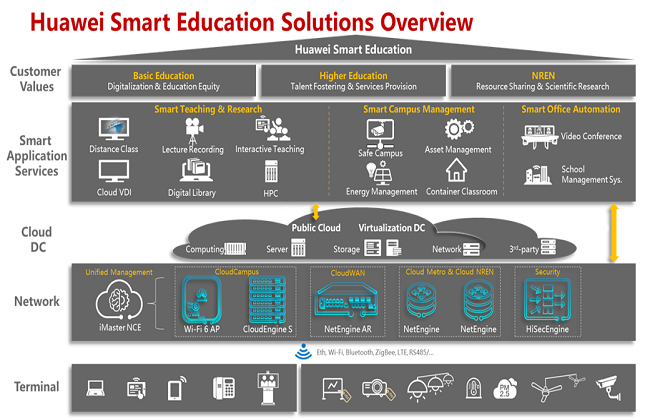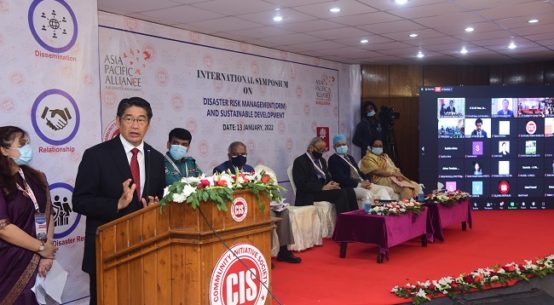
Huawei has recently organized the Asia-Pacific Higher Education Innovation Forum through live streaming with the theme “Embracing the New Era of Intelligent Education.”, a press release said on Tuesday.
The forum invited industry experts from UNESCO ICHEI, NUS, Open University, Thammasat University, National University of Malaysia, and PwC, including 450 informatization directors, partners, and business luminaries.
Together they focused on topics such as smart campus, online education, and smart classroom and discussed the development trend of education ICT and the challenges and opportunities for education informatization in the post-pandemic era, the release read.
At the opening ceremony, Nicholas Ma, President of Huawei Asia Pacific Enterprise Business Group, shared Huawei’s understanding of ICT development in higher education in the Asia-Pacific region, as well as its vision of smart higher education in the future.
The release said, in the Asia-Pacific region, Huawei has served more than 300 colleges and universities with its education ICT solutions and has built ICT academies for 224 schools and trained over 10,000 students. Huawei has also developed more than 4300 ICT professionals for various countries and will continue to serve customers in the education industry and cultivate more high-quality, innovative talent through the Asia-Pacific region.
Professor Zhao Jianhua, Senior Specialist of UNESCO ICHEI said, today’s education industry is being shaped by five major digital technologies: AR, personalized hybrid learning, gamification, AI, and IoT. What’s more, there will be five new applications in the education industry: a more efficient learning system, mental health monitoring, personalized distant education, automated data processing, and personalized collaborative education.
Prof. Andrew Zhao (Senior Specialist of ICHEI (UNESCO), Deputy Director, Center for Higher Education Research, Southern University of Science and Technology) mentioned that ICHEI recently launched an international platform for higher education teachers, which is named as International Institute for Online Education (IIOE). One of the goals of IIOE is to enhance the ICT capacity of higher education teachers to adapt to the digitalized education transformation.
On the primary challenges faced by universities and higher learning institutes, Assoc. Prof. Jirapon Sunkpho (Vice-Rector of IT, Thammasat University) reiterated that ensuring students with proper devices and Internet connection is the first task to innovation in online learning.
On the comments for key success factors on digital transformation in higher education, Joseph Ho (Director, PwC Strategy&) commented that it is important to know how to use the existing setup today and integrate more technology into online engagement and maintaining engagement in order to do much more than just teaching. The key is maintaining the communication alive and keeping students engaged.
On the same note, Assoc. Professor Dr. Nurhizam Safie (Deputy Dean (Networking & Alumni), IST Faculty Universiti Kebangsaan Malaysia) stressed that the critical success factor for digital transformation in higher education is to embrace the new online pedagogy and it’s really about effective change management and managing the transition to online learning.
Currently, many universities are facing similar problems, such as a lack of teacher-student-classroom interaction, the insufficient sharing of education resources, difficult management due to scattered school services, high energy consumption, and low decision-making efficiency. Therefore, it has become a priority for education administrators and teachers to tackle such challenges. At this forum, Shi Ri, Huawei APAC, introduced the Huawei Smart Campus Solution and Smart Classroom Solution designed for higher education. Huawei is collaborating with industry-leading partners and is leveraging its cloud platform to provide E2E smart education solutions that cover smart devices, converged networks, and teaching and management applications for university customers in multiple countries, including South Africa, Italy, and UAE.
Dr. Teo Tee Hui, Vice President of The Institution of Engineers, Singapore and Senior Lecturer at Singapore University of Technology and Design (SUTD), introduced the cooperation projects between SUTD and HUAWEI CLOUD. Particularly, he emphasized the Smart Hybrid Learning Solution, which includes modules like cloud-based learning management system, smart hybrid lesson, online exam, AI proctoring, virtual computer laboratory, and VDI, and uses Huawei IdeaHub to implement online and offline interactive teaching.
Higher education is the basis for a country to cultivate innovative talent, industrialize research achievements, and transform the economy. As a world-leading ICT solution provider, Huawei will never cease to innovate and provide simplified, secure, open, and intelligent products and solutions for the education industry in the Asia Pacific and around the world, facilitating the digital transformation of learning and education.


